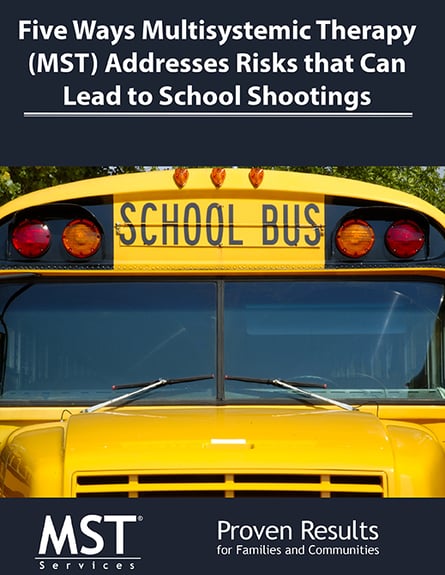Communities are looking for answers to stop school shootings:
MST's mental health treatment can play a vital role
Wednesday, February 14th, 2018 was like any other Wednesday for me. I was wrapping up my meetings for the day until I received an urgent text from my husband, asking if I had seen the news about Marjory Stoneman Douglas High School in Parkland, FL—our oldest nephew’s school. He told me that our nephew, Blake, was okay and his dad was on his way to get him. I was thankful for that moment, but then the news began to come in about the other victims of this senseless act of violence. We called to check on our family, who is very involved in the Parkland community, and everyone was in shock. Blake spoke with my husband and told him that his football coach had passed away, but said “It’s okay, he died a hero.” His words stunned both of us. The following week, he attended the funerals of his four friends who were killed and his beloved hero, Assistant Coach Aaron Feis.
When watching the maturity and passion of Blake and his peers from Marjory Stoneman Douglas High School, I have hope for our future. I do also worry. I worry about the people that were exposed to serious trauma, the young people at the school, the teachers, staff and administration, along with the parents who experienced loss, and those whose children were safe. I worry that when time wears on, which it will and has for each tragedy like this, there will not be access to necessary youth mental health services. We can debate about political ideology all day long and discuss our constitutional rights, but the fact is, we need more access to youth mental health treatment in this country.
There is no singular solution to violence, but MST can play an important role in helping communities stop school shootings
Through the MST model, the therapists work very closely with each system that the young person is involved with: family, school, peers, and community. This approach opens the lines of communication between family and the other players in the youth’s life, which significantly increases the opportunity to help the young person succeed in all aspects in their life. We often find out that collaboration and communication was exactly what was missing between home and school, which makes a huge impact on how the youth behaves in school, their mental health, and their overall academic success.
The adults in the community at large need to pay attention to our youth. It is so important for parents, teachers and other community members to advocate for youth that may be experiencing mental health symptoms. Many young people and their families who are in need of proven youth mental health treatment or services do not have access to them—either because they cannot afford them or because the services do not exist in their communities. Multisystemic Therapy is a scientifically proven intervention for at-risk youth that can play a role in addressing these issues by working with families and schools to give access to youth mental health treatment that can give them the skills needed to succeed.
For more information about factors related to school safety, visit our School Safety Resources page by clicking here.
or
Click here to download the white paper
on how MST Addresses Risks that Can Lead to School Shootings


